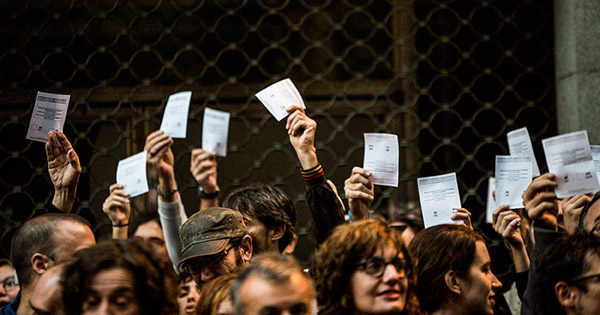FOCUS on Separatist Movements: Catalonia
Kiara McGaughey
Staff Writer
The Spanish autonomous region of Catalonia is one with its own rich and distinct culture, customs, and language developed over thousands of years. Catalonian separatist movements have strengthened their presence and reignited the debate of whether there should be an autonomous Catalan state.
Catalonia has seen multiple separatist movements and rebellions as far back as the 17th century. In the 20th century, the region’s freedoms were stripped after the Spanish civil war under the fascist dictator Francisco Franco – practicing Catalan customs and speaking the native language became greatly discouraged and sometimes illegal, according to Smithsonian Magazine. After Franco fell from power, Catalonia regained autonomy under the 1978 Spanish constitution, according to BBC.
In 2006, the region was classified as a nation by Spain in an autonomy statute and given the same taxation responsibilities as Spain’s central government as the region began to prosper. However, this status was revoked by the Spanish Constitutional Court in 2010. Tensions were further exasperated between Catalans and Spain during Spain’s financial crisis in 2008 that forced public spending cuts in the area. Many Catalans also felt overly taxed and that too little went toward public services. The crisis only reinforced feelings that the region should be independent.
Given the strength of Catalonia’s national identity and the region’s history with separatist movements and rebellions, today’s independence movement stems from the history and politics of the region. Catalonia’s separatist movement became incredibly predominant in 2013 when the regional parliament, as well as the leader of the Union and Convergence party Artur Mas, called for a referendum to be held the following year regarding Catalonian opinion on independence from Spain. The referendum was suspended by Spanish Prime Minister Mariano Rajoy, but Mas proceeded with the referendum by claiming that it was an informal poll. One-third of voters in Catalonia voted on the referendum, where an estimated 80 percent of participants voted in favor of independence.
In 2015, Catalan separatist parties won a regional election and scheduled a full referendum through the regional parliament for October 1, 2017, a move considered illegal by Spain’s constitutional court. Spanish authorities attempted to seize ballot forms and arrested multiple pro-independence officials. On the day of the vote, police tried to stop voters from entering polling offices and used excessive force, injuring hundreds, reports Human Rights Watch. Many could not vote due to interference by authorities, and voter turnout was reportedly only 42 percent. Of those able to vote, 90 percent were in favor of independence. However, due to voting difficulties and ballots getting lost, this number is relatively unreliable. Reuters reports that later polls showed that only 47.2 percent favored independence.
After the referendum, the Spanish government enacted emergency powers to dissolve the Catalan parliament after it voted to declare independence from Spain. While many of the parliament’s leaders were arrested, regional President Carles Puigdemont was able to escape to Belgium. The leaders were to stand on trial on the charges of sedition, though many across Spain protested the trial, reports EFE News. UN leaders also urged Spain to not press charges against the parliament members, according to the UN Office of the High Commissioner for Human Rights.
ABC News reports that support for separatism in the region has remained strong even amid the COVID-19 pandemic and wins by the pro-union Socialist Party in recent elections. Separatist leaders have stated that Catalonia would have fared better in the pandemic had it been independent, pointing towards the Spanish government’s failures during the crisis, according to Reuters. Despite the continued strong support for separatism, proponents of an independent Catalonia face many obstacles. Puigdemont, who is currently in exile in Belgium, has lost immunity from the European Parliament and may be sent back to Spain, the New York Times states, where he may be tried by Spanish courts on sedition charges.
Photo courtesy of SOPA Images




